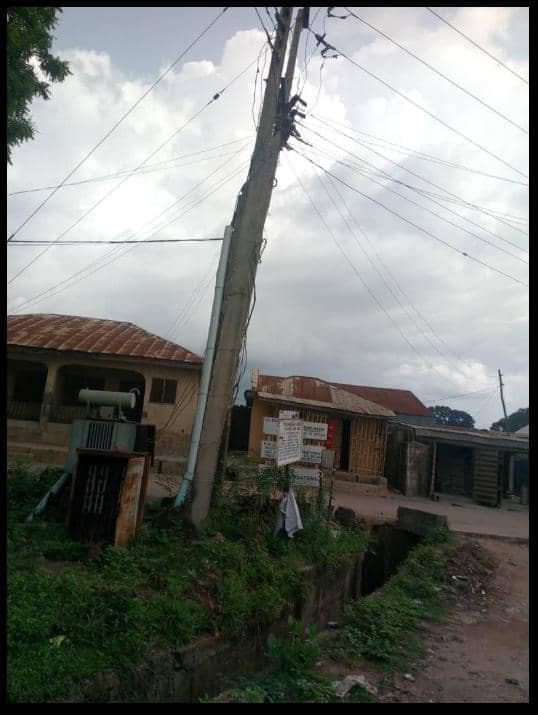Fatimah Idera
For almost ten years, Mr. Tiamiyu Tajudeen, an electrician based in Oke Andi, Ilorin, Kwara State, has struggled with continuous darkness, severely affecting his vocation, which relies heavily on power supply.
Consistent power outages due to the lack of transformers have made his services costlier than he would have liked.
“You can’t compare electricity with alternative power. Not having electricity has greatly affected my pricing because my work here has been 99% reliant on generators for years,” he told this reporter.
When this reporter visited the area in June 2024, residents and business owners explained that they have only had power roughly three times a year for the past five years.
“It has been so long since we’ve had light. Those who have electricity use stabilizers, fans, and machines in their homes, which might have issues and need repairs at the rewinder shop. But for those who don’t use their appliances, they won’t,” Tiamiyu added.

Another resident of Oke Andi, Kamoru Bello, whose daily life has been affected by the blackout, explained that he can’t remember the last time he used his television or any household appliances that would have made his life better.
“It is like I am no longer in this world because I certainly don’t know what goes on around me. I can’t charge phones, I can’t work remotely, and fuel prices are unbearable for alternative power,” Bello lamented.
The Shady Contracts
Electricity plays a crucial role in everyday life, especially in daily routines, which rely heavily on its availability.
Electricity is not only vital for daily life at home but is also extremely important for many aspects of the world, such as communication, transportation, and many other sectors that depend on this power source.
It is hard to quantify how much the lives of residents in this community would have improved if the N44.5 million awarded for the installation of transformers at Oke Andi, Ita Nmo, and other communities in Kwara State in 2022 had been duly spent.
The Ministry of Power approved the contract and placed its supervision under the Rural Electrification Agency (REA).
No new transformer has been supplied or installed for the community’s use. When the load was too much for one of the transformers and it blew, we had to contribute funds to fix it ourselves.
The Federal Government consolidated project was awarded to Scotben Nigeria Ltd.
Checks on the Corporate Affairs Commission portal reveal that the company name cannot be found. A further search on NG-Check.com showed that the company was established and registered on 28 August 2013, with Sunday Ajayi and Egbet Nathaniel as directors. As a private limited company located in Abuja, several searches revealed it is not active online, nor are the names of the directors.

The former senator representing Kwara central, AbdulRaheem Yahaya Oloriegbe, who facilitated the project, was called and sent several messages and emails, but none were responded to.
Residents Narrate Ordeal
Mubarak Sanni, a mechanic and appliance service technician in Oke Andi, said he has spent a lot of money on petrol to test the appliances he works on, leading to an increase in his prices.
“The last time they brought light was four months ago; this year, we have had electricity just once. We need new transformers to help relieve the workload on the old ones. There are several times I have to use my ‘I better pass my neighbor’ generator, which cannot even power some engines.
“Our transformer is faulty because it’s the one that supplies power to the community. The last time the transformer blew, we, the community members, had to contribute money to repair it,” he revealed.
He noted that they would be very glad if a new transformer is installed in Oke Andi and if stable electricity is provided to improve their businesses and end the insecurity in their community.

According to Bloomberg, an average home in Nigeria spends $12 billion on alternative and self-generated power for about nine hours daily to operate their businesses.
The World Bank noted that only 57 percent of the country’s 200 million population have access to electricity, with just 31 percent of people living in rural areas having access to electricity.
According to a report, statistical data further shows that over 40% of households in Nigeria own and use generators for their daily electricity requirements. This implies that the impacted households spend about $14 billion annually on generator fueling due to insufficient power supply from the national grid.
Mrs. Ghazali Zaynab, a woman in her prime who sells drinks at Ita Nmo, lamented how the power outage has contributed to her business loss.
“I had several drinks in my fridge to sell, but there is no electricity, and I don’t have a generator as an alternative. This darkness contributes to hunger and poverty among us residents, as I find it hard to sell my goods and feed my children,” she lamented.
The Ministry of Power was sent emails, and several calls were made to the contacts available on their website, but none were responded to at the time of filing this report.
The Rural Electrification Agency was also sent an FOI request and responded by mail, stating they would get back to this reporter, but no response has been received so far.
Expert Weighs In
In an interview, energy and electricity expert Mr. Olubunmi Martins, the CEO of G3 Roundtable, explained that the power sector is one of the most fragile but susceptible to corruption in the country.
“We now run a no-government system in the power sector where residents have to buy and install transformers. For this particular project in question, according to you, you have tried to get both the government and the contractors to speak, but they haven’t. What this tells us and everyone who cares to listen is that they have either not disbursed funds or the company is not functional.
“The realistic solution to this neglect is for the community to constitute a Community Development Association (CDA) to negotiate with the DisCos on the issue of transformers because this project won’t see the light of day,” he stated.
This story was produced with support from the Wole Soyinka Centre for Investigative Journalism (WSCIJ) under the Collaborative Media Engagement for Development Inclusivity and Accountability Project (CMEDIA) funded by the MacArthur Foundation.




